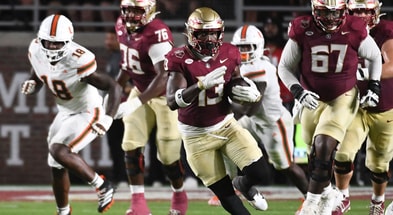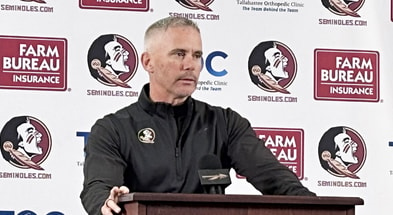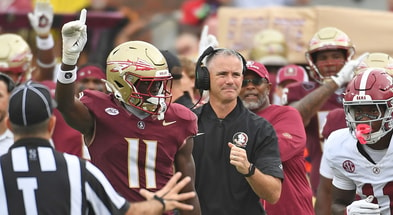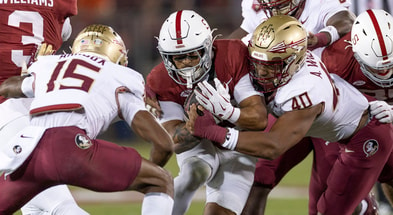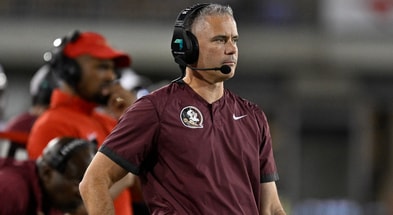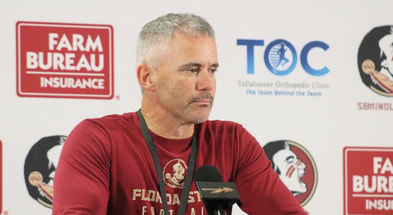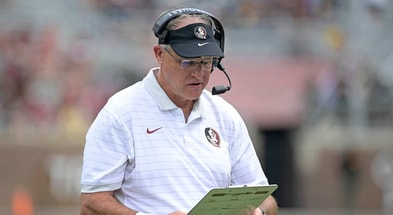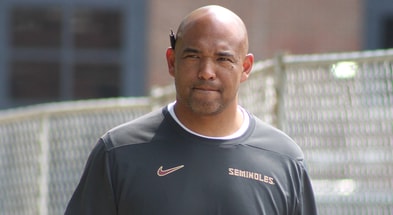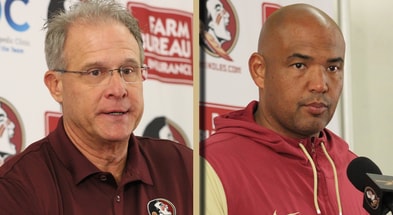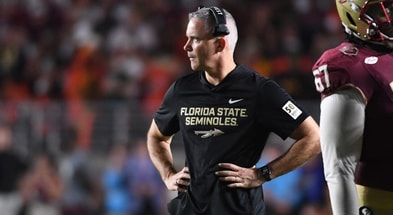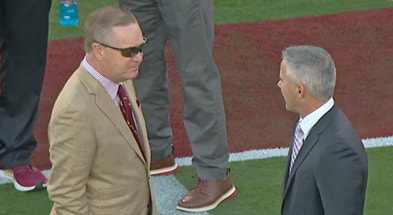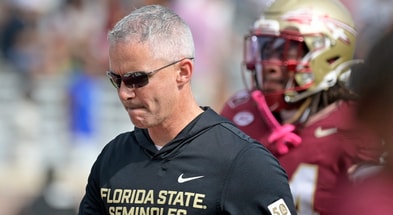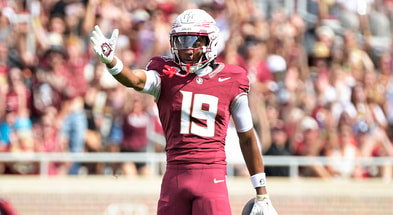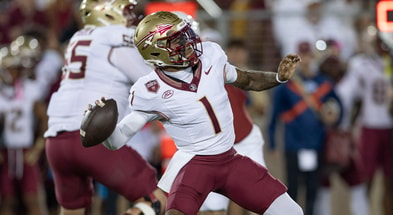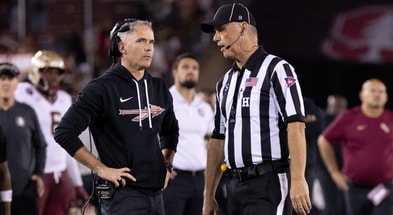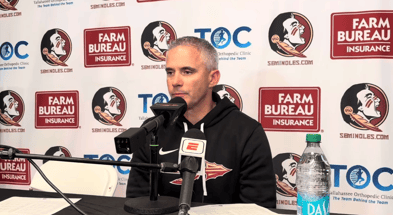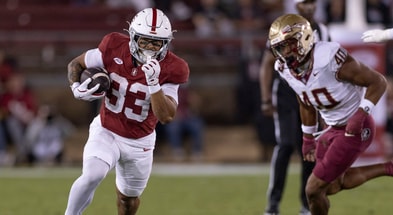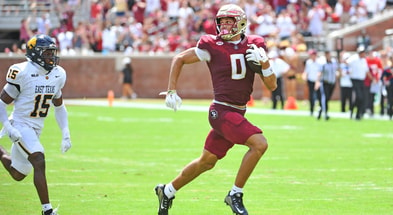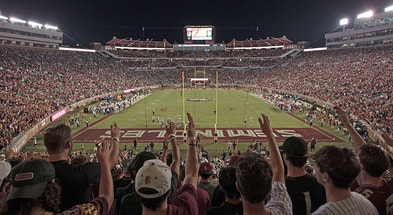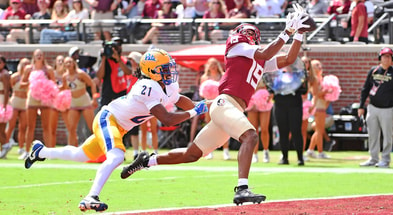Florida State intends to turn up heat for greater revenue at ACC spring meetings this week
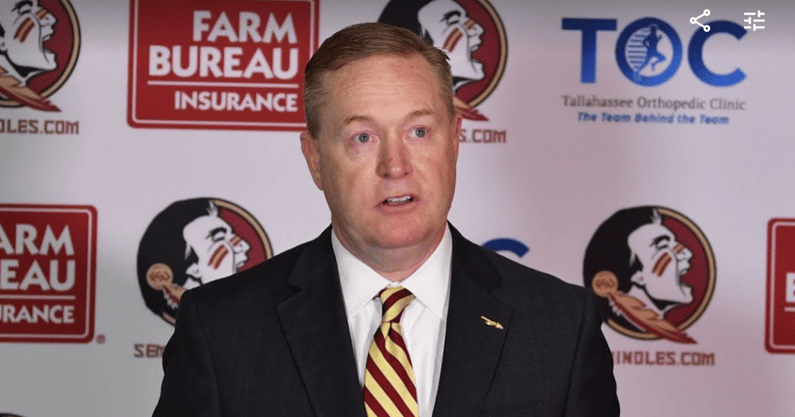
Nearly three months after Florida State’s administration created national headlines by criticizing the ACC’s television contract with ESPN and saying that “something has to change” in the future, a delegation of Seminoles will travel to Amelia Island on Monday for the ACC’s annual spring meetings.
And according to second-year athletics director Michael Alford, Florida State will not be backing down from that position.
In an interview this past week with Warchant, Alford said the university will continue to push ACC Commissioner Jim Phillips and the other schools for uneven revenue sharing — with football powers like Florida State and Clemson receiving greater financial distributions than others in the conference — and also encourage the league to find other ways to close the widening revenue gap with the Southeastern Conference and Big Ten.
Alford confirmed those will be “hot topics” when league officials get together in the small beach town north of Jacksonville.
“I make no bones about it that we’re the top brand in the conference,” Alford said. “And when you look at how they measure media contracts, with households, viewership and championships, we’re driving that viewership for our conference at a high rate.
“There are a couple schools that are really driving that media contract.”
Florida State officials have been unhappy with the ACC’s television contracts for more than a decade, but the issue reached critical mass this past year when industry projections showed that SEC schools will soon receive about $72 million per year — per school — and Big Ten schools will receive about $80 million.
At an FSU Board of Trustees meeting, Alford said ACC schools received a total payout of about $42 million this past year — with about $36 million coming from the conference’s television deal with ESPN.
That will leave schools like Florida State, Clemson and Miami, who are trying to compete for national championships in football, men’s basketball and other sports, with a revenue gap of at least $30 million each year, when compared to their peers.
“I compliment Jim Phillips and his staff for everything they’re trying to do,” Alford said. “They understand what’s coming. I’ve made it abundantly clear that there’s a $30 million gap that’s starting next season. And that can’t go on for years, because then you just can’t catch up.”
Even more concerning is the fact that those other leagues will get opportunities to renegotiate their contracts again before the ACC’s deal expires in 2036. So the revenue gap could expand even wider.
And, as Alford pointed out, the Big 12 Conference’s recently renegotiated television contract will be up for bid again following the 2030-31 season.
The fact that in-state school UCF is now joining that league is not lost on Alford.
“If you look at the revenue projections, they should have a better agreement than we have by going out to market,” he said. “That means there’s going to be another school in the state that’s going to have a better agreement than Miami and us. And that’s just not acceptable to us.”
Florida State is not alone in this quest for uneven revenue sharing. Clemson A.D. Graham Neff said this week that he will be “very direct” with the leadership of the ACC and other schools that a new model is needed. Miami A.D. Dan Radakovich has been a vocal proponent as well, while several other schools are reportedly opposed.
An ACC committee of athletics directors has been studying this topic for a year or longer, but there didn’t appear to be much appetite for it at the ACC’s winter meetings, which is what led Alford to make his strong public comments in February. And there isn’t expected to be a major reversal when league officials get together starting Monday at Amelia Island.
But the reality is, even if the other ACC schools signed off on receiving smaller distributions so that the higher-profile football schools could benefit, it likely wouldn’t put a major dent in the $30 million gap. One source, who is familiar with the discussions, told Warchant that the most optimistic projections would yield an additional $5 million for schools like Florida State each year, and there is no confidence anything close to that will happen.
“We’re going to continue to push,” Alford said, noting that he believes Phillips — who recently received a three-year extension — is doing everything he can to find an amicable solution. “He’s a great leader. There’s no doubt about it. I wouldn’t want anyone else leading us through this right now. … He understands where we are. And he understands where other schools are. He knows that we want to get aggressive and invest in all of our programs, and we want to win championships across the board.
Top 10
- 1Trending
Lane Kiffin
Money will not impact decision
- 2New
Virginia Tech
Intel on Hokies coaching search
- 3Hot
LSU Hot Board
Next Tigers head coach targets
- 4
Coaching Carousel
Ranking top open jobs
- 5
Arch Manning
Sarkisian provides injury update
Get the Daily On3 Newsletter in your inbox every morning
By clicking "Subscribe to Newsletter", I agree to On3's Privacy Notice, Terms, and use of my personal information described therein.
“All 20 sports — we fund them to win championships. Not all schools in the country do that. They pick and choose and prioritize sports. Right now, we’re funding them all to go win championships. And that’s something we want to continue to do.”
Can Florida State do that while remaining in the ACC? That’s a major question.
Do the Seminoles have any options if nothing changes? That’s another major question.
Attorneys from Florida State, Clemson and several other schools have made trips to the ACC’s North Carolina headquarters in recent months to review the league’s television contract and Grant of Rights, which is believed to bind each member school to the conference through 2036.
While the Seminoles haven’t necessarily threatened to break that agreement and look for a new conference, they haven’t ruled it out either.
FSU Board of Trustees members actually discussed what the cost might be to exit the conference at the February meeting, and Board Chair Peter Collins later told Warchant, “We have a very good handle on the grant of rights.”
When he spoke with Warchant this week, Alford said he is in constant contact with other athletics directors around the country to get a feel for what might be on the horizon with conference realignment.
With the SEC grabbing Texas and Oklahoma from the Big 12 and the Big Ten snatching USC and UCLA from the Pac-12, those raided conferences are expected to make moves to solidify their futures. And it’s not yet known if the new “Power Two” are going to keep expanding.
“It’s going to have an impact on everything we’re doing,” Alford said. “Right now, realignment is not going to stop. There is definitely going to be some more shifts coming. Is that three conferences of 20 — where you have 60 [schools] that kind of break away from the rest? That’s the theory of many. So who’s going to be that third conference of 20, if that’s the case?”
Until that national picture becomes clearer, Florida State officials plan to keep doing what they’ve been doing. Trying to squeeze every dollar they can out of the ACC, and making sure that everyone in college football understands the value of the Seminoles’ brand.
Just over two weeks ago, FSU’s official football account posted on Twitter that a recent study showed more than 3.4 million college football fans identified themselves as Florida State fans. About 2.4 million of those fans were located in the South, which according to the survey, showed that the Seminoles are the third-most popular team in the region.
“Everybody has a lot of different theories [about the future],” Alford said. “Our job, and I’ve said it since Day 1 of being athletics director, was to make sure No. 1, that we get our internal house in order. That we’re catching up on the facilities, because we were desperately behind our peers. We were desperately behind our own conference. That’s getting caught up now to being respectable.
“Then position ourselves for whatever comes — that we’re on the forefront. That we’re being talked about. Yes, we have the tradition. But you need to have your programs in conference title and national title hunts across the board. So whatever opportunity comes, you’re in the best position to take advantage of it.”
Talk about this story with other die-hard FSU football fans on the Tribal Council.
